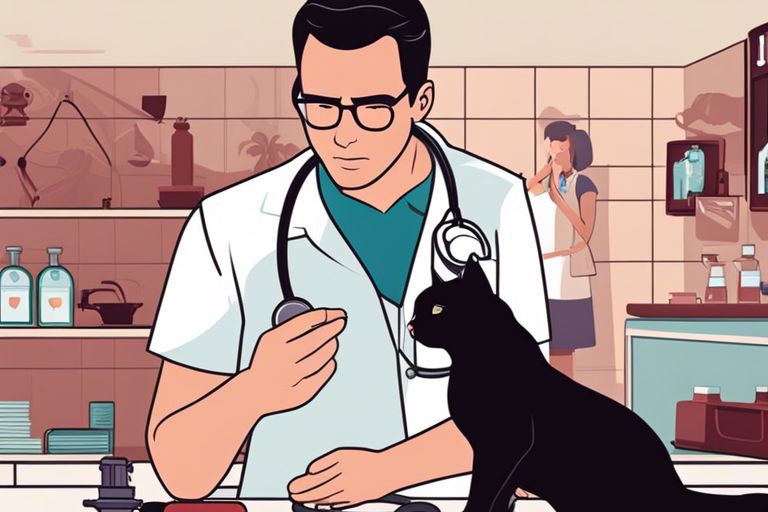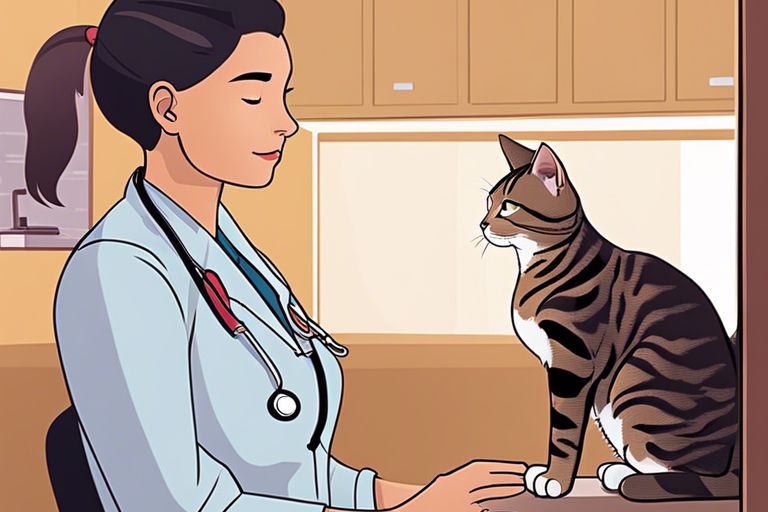Do you know that heart problems are not just limited to humans? Cats can also suffer from a range of cardiac issues that can affect their health and overall well-being. It’s important to be aware of the common heart problems that can afflict your feline friend, as early detection and treatment can make a significant difference in their prognosis. In this blog post, we’ll take a closer look at some of the most prevalent heart problems in cats, including heart murmurs, cardiomyopathy, and heartworm disease. Understanding these conditions and their symptoms can help you be more proactive in seeking veterinary care for your beloved pet.
Key Takeaways:
- Cats are prone to several heart problems such as hypertrophic cardiomyopathy, heart murmurs, congestive heart failure, and heartworm disease.
- Hypertrophic cardiomyopathy is the most common heart disease in cats, causing the heart muscle to thicken and become less efficient at pumping blood.
- Heart murmurs can indicate a variety of underlying heart problems and should be thoroughly evaluated by a veterinarian.
- Congestive heart failure occurs when the heart is unable to pump enough blood to meet the body’s needs, leading to fluid buildup in the lungs and abdomen.
- Heartworm disease is caused by parasitic worms that can lead to severe heart and lung damage if left untreated.

Common Feline Heart Conditions
If you’re a cat owner, it’s important to be aware of the most common heart problems that cats can experience. Understanding these conditions can help you provide the best care for your feline friend and recognize any potential symptoms early on.
Hypertrophic Cardiomyopathy (HCM)
If your cat has been diagnosed with Hypertrophic Cardiomyopathy (HCM), it means that their heart muscle has become abnormally thick. This condition can lead to various symptoms such as difficulty breathing, lethargy, and sudden collapse. It is the most common heart disease in cats and can affect cats of any age, breed, or sex. HCM can be hereditary, so if your cat is predisposed to this condition, your veterinarian may recommend regular heart check-ups to monitor their cardiac health.
Dilated Cardiomyopathy (DCM)
If your cat is suffering from Dilated Cardiomyopathy (DCM), it means that their heart muscle becomes weak and unable to pump blood effectively. This can lead to symptoms such as coughing, difficulty breathing, and lethargy. DCM was once a common feline heart condition, but it has become less prevalent due to dietary taurine supplementation in commercial cat foods. Nonetheless, it is essential to be aware of this condition and monitor your cat’s overall health vigilantly.
Signs and Symptoms of Heart Problems in Cats
While heart problems in cats can often be asymptomatic, it is important to be aware of the signs and symptoms that may indicate an issue with your feline friend’s heart. By being vigilant and observant, you can catch potential heart problems early and seek appropriate veterinary care.
Behavioral Changes and Physical Signs
When it comes to identifying heart problems in your cat, it’s essential to pay attention to any behavioral changes and physical signs. You may notice that your cat becomes lethargic, has difficulty breathing, or is less active than usual. Additionally, you may observe an increased respiratory rate, coughing, or even fainting episodes. Your cat might also display reduced appetite, weight loss, or fluid accumulation in the abdomen. These signs and symptoms can indicate a potential heart problem and should not be overlooked.
Diagnostic Approaches
If you suspect that your cat may be experiencing heart problems, it is crucial to consult with your veterinarian for a proper diagnosis. Your vet may recommend diagnostic tests such as blood tests, electrocardiography (ECG), X-rays, or ultrasound to assess your cat’s heart health. These tests can help to identify any abnormalities in the heart’s structure or function, leading to an accurate diagnosis. Early detection of heart problems allows for timely intervention and management, which can significantly improve your cat’s prognosis.
Treatment and Management
Keep in mind that treatment and management of heart problems in cats will depend on the specific diagnosis made by your veterinarian. However, there are some general approaches that can be taken to help manage and improve your cat’s heart health.
Medical Interventions
When it comes to medical interventions for heart problems in cats, your veterinarian may prescribe medications to help control symptoms such as high blood pressure or fluid buildup in the lungs. These medications may include ACE inhibitors, beta-blockers, diuretics, or calcium channel blockers. In some cases, your cat may need to visit a veterinary cardiologist for more specialized care, such as the implantation of a pacemaker or surgical correction of a congenital heart defect.
Lifestyle Modifications and Care
Along with medical interventions, there are some lifestyle modifications and care that can help improve your cat’s heart health. Your veterinarian may recommend changes to your cat’s diet, such as a prescription cardiac diet that is lower in sodium and fat. Additionally, regular exercise is important for maintaining a healthy weight and reducing stress on the heart. Finally, it’s crucial to monitor your cat’s condition closely and follow up with your veterinarian as recommended to ensure that any changes in your cat’s heart health are addressed promptly.
Prevention and Early Detection
Unlike dogs, cats are very good at hiding their symptoms of heart disease. This is why it’s crucial to keep an eye out for any subtle changes in your cat’s behavior or health. To ensure early detection and treatment, you should schedule regular veterinary check-ups and be mindful of any concerning symptoms. For a more detailed explanation of the causes, diagnosis, and treatment of heart disease in cats, you can visit Heart Disease In Cats, Causes, Diagnosis and Treatment.
Role of Diet and Exercise
One of the most impactful ways you can contribute to the prevention of heart problems in your cat is by controlling their diet and exercise routine. Obesity and lack of physical activity can significantly increase the risk of heart disease. Ensure your cat receives a balanced diet and follows a regular exercise regimen to keep their heart in good shape.
Regular Veterinary Check-ups
Scheduling routine veterinary check-ups for your cat can be a lifesaver when it comes to heart health. The vet can check for any early signs of heart disease and provide necessary guidance on how to monitor and maintain your cat’s heart health. Early detection of any heart issues can significantly improve the chances of successful treatment and management.
Conclusion
Ultimately, it is important to educate yourself about the most common heart problems in cats so you can recognize the signs and symptoms in your own pet. By being aware of these issues, you can seek timely veterinary care and potentially help manage or even prevent serious heart conditions in your feline companion. Regular check-ups and a healthy lifestyle can also go a long way in maintaining your cat’s heart health. Remember, early detection and intervention are key in managing heart problems, so stay vigilant and proactive in caring for your pet’s cardiac well-being.
FAQ
Q: What are the most common heart problems in cats?
A: The most common heart problems in cats include hypertrophic cardiomyopathy, congestive heart failure, and heartworm disease. Hypertrophic cardiomyopathy is the most prevalent and is characterized by the thickening of the heart muscle, while congestive heart failure occurs when the heart’s ability to pump blood is compromised. Heartworm disease, caused by parasitic worms, can also affect a cat’s heart.
Q: What are the signs of heart problems in cats?
A: Common signs of heart problems in cats include difficulty breathing, coughing, lethargy, weakness, decreased appetite, weight loss, and in some cases, fainting. It’s important to note that cats are masters at hiding signs of illness, so these symptoms may not always be immediately obvious.
Q: How are heart problems in cats diagnosed and treated?
A: Diagnosing heart problems in cats typically involves a thorough physical examination, blood tests, X-rays, ultrasounds, and electrocardiograms. Treatment for heart problems in cats may include medications to manage symptoms, such as diuretics and heart medications, and in some cases, surgery may be necessary. It’s important to work closely with a veterinarian to develop a tailored treatment plan for your cat’s specific condition.

Jayley, a devoted cat enthusiast, also writer for other cat blog as well. She aims to dedicated to providing comprehensive information, insights, and advice on everything you’d ever want to know about our whiskered companions.
